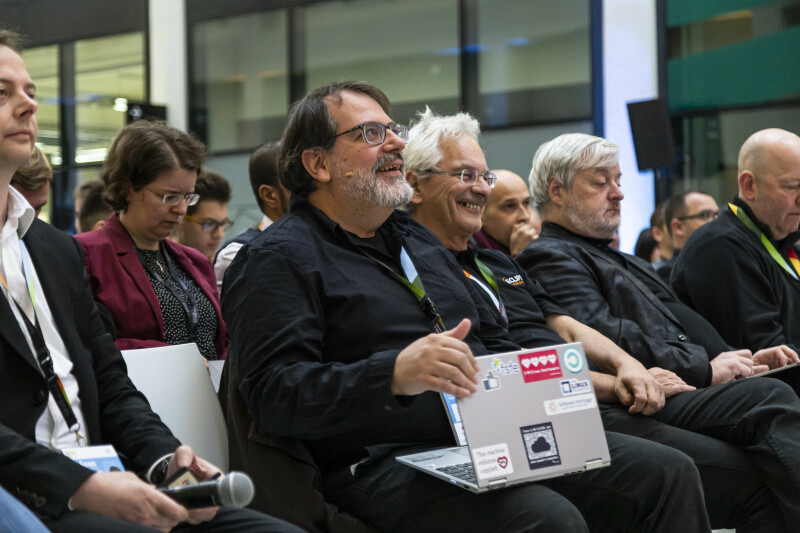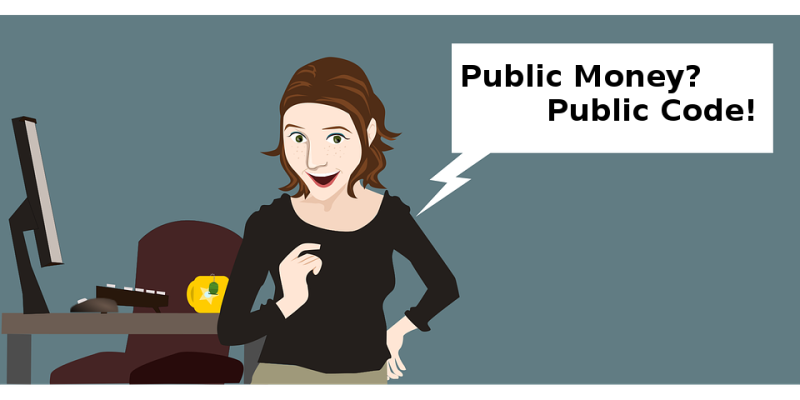35 ans de la FSF +++ Participation à la SFSCon +++ Emploi technique vacant
vendredi 23 octobre 2020 à 01:0035 ans de la FSF +++ Participation à la SFSCon +++ Emploi technique vacant
Dans notre lettre d'information d'octobre, vous trouverez des informations sur le trente-cinquième anniversaire de la FSF, notre participation à venir à la SFSCon, une vacance pour un emploi technique et sur les autres diverses activités de notre communauté.
Félicitations à la FSF pour son trente-cinquième anniversaire
Il y a 35 ans, notre organisation sœur, la Free Software Foundation, a été fondée afin de s'engager pour la liberté des utilisatrices et utilisateurs d'utiliser, d'étudier, de partager et d'améliorer les logiciels. Avec en ligne d'introduction "Notre travail ne sera terminé que lorsque toutes les utilisatrices et tous les utilisateurs d'ordinateurs seront capables de réaliser leurs tâches digitales en complète liberté". Ceci est une promesse qui tient toujours, même après trente-cinq années de travail pour la liberté du logiciel, ayant inspiré d'innombrables personnes et de nombreuses organisations à faire front pour la liberté des utilisatrices et utilisateurs. Le président de la FSFE Matthias Kirschner a enregistré un discours de félicitations dans lequel il médite sur l'importance que la FSF et notre mouvement ont eu et continuent d'avoir au cours des années.
Participation à la SFSCon
La conférence Sud-Tyrolienne pour le Logiciel Libre, SFScon, est une des conférences sur le Logiciel Libre annuelle établies en Europe. Ces dernières années, nous y avons été représentés lors d'exposés, de sessions de travail et par notre stand d'information. L'année dernière, nous avons organisé notre Évènement Communautaire dans le contexte de la SFScon, afin de pouvoir y rencontrer notre communauté ainsi que de nombreux intéressés, puis nous avons finalement fait le bilan de notre travail.
En raison de la situation actuelle, l'édition 2020 de cet évènement ne pourra se faire qu'en mode mixte : en ligne, et au NOI Techpark pour un nombre limité de personnes. Mais bien entendu, la FSFE contribuera encore au programme.

Nous avons organisé sept exposés lors desquels les questions légales ont pu être éclaircies et les développements politiques courants on pu être analysés. Les questions pratiques concrètes concernant la conformité, par exemple pour les SMEs, y seront adressées, ainsi que les questions sur le machine learning et quels problèmes surviennent lors du développement d'un smartphone "libre". Vous trouverez plus d'informations sur notre piste et sur la SFScon2020
L'impact financier le plus important auquel la FSFE doit faire face en ces temps de distanciation physique est l'annulation de conférences sur le Logiciel Libre, incluant nos propres évènements. Pour conserver un mouvement pour la liberté du logiciel solide et vivant, merci d'envisager de faire don d'une partie ou de l'intégralité de votre budget conférences aux organisations pour le Logiciel Libre, y compris la FSFE.
Emploi technique vacant
La FSFE recherche un.e étudiant.e salarié.e pour soutenir notre travail : habiliter tout le monde à maitriser la technologie. Cette personne travaillera 10 heures par semaine dans le bureau de Berlin (télétravail ultérieurement possible) et soutiendra l'infrastructure technique de la FSFE en travaillant en étroite collaboration avec nos administrateurs de système. Le délai de candidature se termine dimanche 15 novembre 2020. Merci de partager cette information avec celles et ceux de votre entourage qui pourraient être intéressés.

Évènements à venir
- Au OSSEU2020, Alexander Sander exposera comment le Logiciel Libre fournit des solutions mondiales à des problèmes mondiaux.
- Lors de la Privacy Week, Alexander Sander exposera notre campagne "Argent Public ? Code Public !" et parlera de comment le Logiciel Libre contribue à faire face à une crise mondiale.
Qu'avons-nous fait ? En interne et en dehors de la FSFE
- Pour le septième épisode de notre Podcast sur la Liberté du Logiciel nous avons discuté avec Vincent Lequertier sur la transparence, l'équité et l'accessibilité comme critères cruciaux pour l'intelligence artificielle (IA) et pourquoi il est important pour notre société de mettre à disposition du logiciel IA sous licence de Logiciel Libre.
- Dans son discours au Software Freedom Kosova 2020 Alexander Sander, directeur des politiques publiques Européennes de la FSFE, a fournie un bref aperçu des activités passées et actuelles de la FSFE pour favoriser la liberté logicielle en Europe, aux niveaux de la politique, du travail légal en entreprise et de conscience publique générale. Le discours a été suivi deux semaines plus tard par une session de travail.
- À la "openSUSE + LibreOffice Virtual Conference" (oSLO), Alexander Sander a donné une conférence sur les avantages d'utiliser le Logiciel Libre dans le secteur public, sur les leçons apprises de la crise du corona et pourquoi il est encore plus important aujourd'hui que jamais auparavant d'employer du Logiciel Libre.
- Nous sommes reconnaissants envers Lioh Möller qui a coordonné l'équipe nationale de la FSFE en Suisse et accueillons le nouveau coordinateur Gian-Maria Daffré accompagné de Ralf Hersel en tant que vice-coordinateur. Le groupe Suisse est bien connu pour son portail éducatif sur le Logiciel Libre Lernen wie die Profis (apprendre comme les pros) et le magazine d'actus et podcast gnulinux.ch.
- Le coordinateur de Berlin Erik Grun accompagné de Katja Jäger a donné une conférence sur le Logiciel Libre pour la société numérique dans l'éducation au campus re:publica à Berlin.
Participez à notre lettre d'information
Si vous souhaitez partager vos opinions, photos ou actualités, merci de nous les envoyer. Comme toujours, notre adresse est newsletter@fsfe.org. Nous sommes impatient.e.s de vous lire !
Si de plus vous souhaitez nous soutenir ainsi que notre travail, rejoignez notre communauté et aidez-nous avec un don ou une contribution mensuelle.
Merci à notre communauté, tous les volontaires, supporters et donatrices et donateurs qui rendent notre travail possible. Et merci à nos traductrices et traducteurs, qui vous permettent de lire cette lettre d'information dans votre langue maternelle.
Vos éditeurs, Erik Albers et Alexander Sander
 European Commission presented only a fig leaf
European Commission presented only a fig leaf
 Public Money? Public Code!
Public Money? Public Code!
 Free Pizza (not as in freedom) lunch at the 2019 FSFE Community Meeting at SFScon. Photo by Patrick Masson
Free Pizza (not as in freedom) lunch at the 2019 FSFE Community Meeting at SFScon. Photo by Patrick Masson
